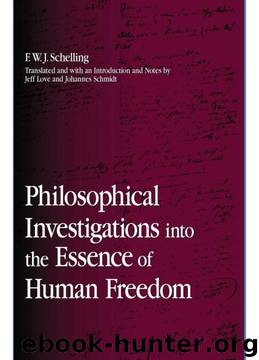Philosophical Investigations into the Essence of Human Freedom (SUNY series in Contemporary Continental Philosophy) by Friedrich Wilhelm Joseph Von Schelling

Author:Friedrich Wilhelm Joseph Von Schelling
Language: eng
Format: mobi
Published: 2010-10-30T13:28:00+00:00
In this sense, "The Parable" represents the kernel of a rationalist critique of the emphasis on revelation, the "leap of faith" or salto mortale that marks the contribution to German thought of Friedrich Heinrich Jacobi (1743-1819). The two texts we include here, excerpts from Jacobi's famous book, On the Doctrine of Spinoza in Letters to Mr. Moses Mendelssohn (1785), and from additions made to the second edition of the same book, which appeared in 1789, give a reasonably clear indication of Jacobi's position and suggest his importance for Schelling as an opponent to be overcome.
Jacobi's book relates several conversations with Lessing, whom Jacobi had met in 1780, and, in doing so, it intentionally suggests that Lessing was a Spinozist. This suggestion was shocking and disorienting for Jacobi's contemporaries; it launched one of the great intellectual tumults of the late eighteenth century, the so-called Pantheismusstreit or the "pantheism debate," which engaged all the foremost minds of that extraordinarily fecund period including Goethe, Kant, Hamann, and Herder.2 This revelation had such force because in the peculiar milieu of late eighteenth-century German intellectual life, "Spinozism" meant "Pantheism," which in turn meant a rationalist atheism. The debate over Lessing's adherence to Spinozism or pantheism became a debate over the authority of reason and, ultimately, a debate over the value of Enlightenment that in various mutations and different terms has continued practically unabated down to the present day. One of Schelling's more remarkable exhibitions of intellectual virtuosity are his opening comments in the Philosophical Investigations on the concept of pantheism where he develops-in avowed opposition to Spinoza-a concept of rationality that has much to do with his philosophy of nature; this concept emphasizes dynamic tension and interplay, the constant activity of opposed forces, a dialectic rather than axiomatic model of rationality.
Download
This site does not store any files on its server. We only index and link to content provided by other sites. Please contact the content providers to delete copyright contents if any and email us, we'll remove relevant links or contents immediately.
| Anthropology | Archaeology |
| Philosophy | Politics & Government |
| Social Sciences | Sociology |
| Women's Studies |
The remains of the day by Kazuo Ishiguro(8981)
Tools of Titans by Timothy Ferriss(8369)
Giovanni's Room by James Baldwin(7330)
The Black Swan by Nassim Nicholas Taleb(7111)
Inner Engineering: A Yogi's Guide to Joy by Sadhguru(6785)
The Way of Zen by Alan W. Watts(6604)
Asking the Right Questions: A Guide to Critical Thinking by M. Neil Browne & Stuart M. Keeley(5762)
The Power of Now: A Guide to Spiritual Enlightenment by Eckhart Tolle(5761)
The Six Wives Of Henry VIII (WOMEN IN HISTORY) by Fraser Antonia(5505)
Astrophysics for People in a Hurry by Neil DeGrasse Tyson(5182)
Housekeeping by Marilynne Robinson(4436)
12 Rules for Life by Jordan B. Peterson(4299)
Double Down (Diary of a Wimpy Kid Book 11) by Jeff Kinney(4261)
Ikigai by Héctor García & Francesc Miralles(4248)
The Ethical Slut by Janet W. Hardy(4243)
Skin in the Game by Nassim Nicholas Taleb(4240)
The Art of Happiness by The Dalai Lama(4125)
Skin in the Game: Hidden Asymmetries in Daily Life by Nassim Nicholas Taleb(3993)
Walking by Henry David Thoreau(3953)
